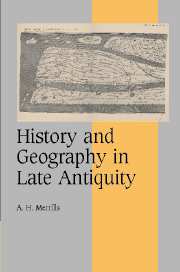2 - Jordanes
Published online by Cambridge University Press: 24 July 2009
Summary
De origine actibusque Getarum, written by Jordanes in around 551, is among the most fascinating and frustrating texts to have survived from the twilight years of the Roman Empire. The Getica – to adopt its most popular designation – did not purport to be a wholly original composition, but was rather an epitome of a twelve-volume Gothic History that the Italian statesman Cassiodorus had composed some two decades earlier. The loss of Cassiodorus' original text has left the Getica in glorious and perplexing isolation. In part a paean to the Ostrogothic kingdom of Italy, even as it disappeared under the rapacious attentions of the Byzantine reconquest, in part a celebration of Justinianic triumph over the group, the scope of the Getica belies either of these limited ambitions. Tracing the history of the people from its origins in the frigid northern island of Scandza, Jordanes dwells at length upon the triumphs and disasters of the Goths through Scythia and the Balkans, digresses on the successes of the Visigoths in Spain and consistently colours his account with judicious borrowings from classical writing on the Amazons, Getes and Huns of the mysterious north.
Had Cassiodorus' Gothic History survived, the Getica would most likely be viewed as a fantastic anomaly: a further illustration of the intellectual curiosity and literary ingenuity of Justinianic Constantinople, to be set alongside the Chronicle of Marcellinus Comes and the multi-faceted writings of Procopius of Caesarea.
- Type
- Chapter
- Information
- History and Geography in Late Antiquity , pp. 100 - 169Publisher: Cambridge University PressPrint publication year: 2005

